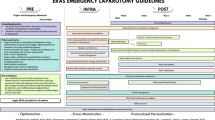Abstract
Postoperative delirium (POD) is not uncommon following major abdominal surgery with its incidence ranging between five and 51%. As cancer affects disproportionately, the population older than 65 years and as delirium is more common in the elderly, surgical oncology patients are at a higher risk of developing POD. The present study was undertaken to explore the impact and associations of POD in Indian patients undergoing oncological major abdominal surgery. A retrospective review of the electronic medical records in a tertiary cancer care institution of all postoperative patients who had undergone major gastrointestinal gynaecological and urological abdominal surgery for cancer and required psycho-oncology referral was performed. Patient, surgery and postoperative outcome-related data were collected. Statistical analysis was performed using univariate and multivariate logistic regression analysis. Out of 824 patients who underwent major abdominal surgery, 33 patients (4.0%) were diagnosed with POD. In univariate analysis, older age and history of addiction were found to be statistically significantly associated with POD (p < 0.001). Among the postoperative factors, respiratory complications (p < 0.001), sepsis (p < 0.05), ICU stay > 24 h (p < 0.05) and electrolyte impairment (p < 0.05) were the significant associations with the POD. Thirty-day mortality was higher in the POD group (p < 0.05). In multivariate logistic regression analysis, advanced age, addictions, respiratory complications and sepsis were found to be significant associations with POD, p < 0.001. Postoperative delirium is associated with higher mortality. Older age, postoperative respiratory complications and sepsis are common contributory factors of postoperative delirium.
Similar content being viewed by others
References
Sanders RD, Pandharipande PP, Davidson AJ, Ma D, Maze M (2011) Anticipating and managing postoperative delirium and cognitive decline in adults. BMJ 343:d4331
International Statistical Classification of Diseases and Related Health Problems, 10th revision (ICD-10)-WHO version (2016) http://apps.who.int/classifications/icd10/browse/2016/en%23/F00-F09. Accessed 10 August 2017
American Psychiatric Association (2013) Diagnostic and statistical manual of mental disorders (DSM-5®). American Psychiatric Pub, Washington, D.C.
Barr J, Fraser GL, Puntillo K, Ely EW, Gélinas C, Dasta JF, Davidson JE, Devlin JW, Kress JP, Joffe AM, Coursin DB, Herr DL, Tung A, Robinson BR, Fontaine K, Ramsay MA, Riker RR, Sessler CN, Pun B, Skrobik Y, Jaeschke R (2013) Clinical practice guidelines for the management of pain, agitation, and delirium in adult patients in the intensive care unit. Crit Care Med 41(1):263–306
Whitlock EL, Vannucci A, Avidan MS (2011) Postoperative delirium. Minerva Anestesiol 77(4):448–456
Radtke FM, Franck M, Hagemann L, Seeling M, Wernecke KD, Spies CD (2010) Risk factors for inadequate emergence after anesthesia: emergence delirium and hypoactive emergence. Minerva Anestesiol 76(6):394–403
Kemeny MM, Busch-Devereaux E, Merriam LT, O'Hea BJ (2000) Cancer surgery in the elderly. Hematol Oncol Clin North Am 14(1):169–192
Rudolph JL, Marcantonio ER (2011) Review articles: postoperative delirium: acute change with long-term implications. Anesth Analg 112(5):1202–1211
Wyld L, Ronald Reed MW, Robinson TG (2012) Surgery for older adults with cancer. In: Bellizzi KM, Gosney MA (eds) Cancer and aging handbook: research and practice. John Wiley & Sons, Inc, Hoboken
Grover S, Kate N, Agarwal M, Mattoo SK, Avasthi A, Malhotra S, Kulhara P, Chakrabarti S, Basu D (2012) Delirium in elderly people: a study of a psychiatric liaison service in north India. Int Psychogeriatr 24(01):117–127
Rudra A, Chatterjee S, Kirtania J, Sengupta S, Moitra G, Sirohia S, Wankhade R, Banerjee S (2006) Postoperative delirium. Ind J Crit Care Med 10:235–240. doi:10.4103/0972-5229.29842
Litaker D, Locala J, Franco K, Bronson DL, Tannous Z (2001) Preoperative risk factors for post-operative delirium. Gen HospPsychiatr 23:84–89
Marcantonio ER, Goldman L, Mangione CM et al (1994) A clinical prediction rule for delirium after elective noncardiac surgery. JAMA 271:134–139
Rudolph JL, Jones RN, Rasmussen LS, Silverstein JH, Inouye SK, Marcantonio ER (2007) Independent vascular and cognitive risk factors for postoperative delirium. Am J Med 120:807–813
Robinson TN, Raeburn CD, Tran ZV, Angles EM, Brenner LA, Moss M (2009) Postoperative delirium in the elderly: risk factors and outcomes. Ann Surg 249(1):173–178. https://doi.org/10.1097/SLA.0b013e31818e4776
Leung JM, EA SLPM, Wang Y, Vaurio L (2005) Are preoperative depressive symptoms associated with postoperative delirium in geriatric surgical patients? J Gerontol A BiolSci Med Sci 60(12):1563–1568
Bowman AM (1992) The relationship of anxiety to development of postoperative delirium. J Gerontol Nurs 18(1):24–30
Patti R, Saitta M, Cusumano G, Termine G, Di Vita G (2011) Risk factors for postoperative delirium after colorectal surgery for carcinoma. Eur J Oncol Nurs 15(5):519–523. doi:10.1016/j.ejon.2011.01.004
Fanning J, Hunt KD et al (1996) Postoperative delirium following radical gynecologic oncology surgery. Int J Gynecol Cancer 6(2):94–97
Ganai S, Lee KF et al (2007) Adverse outcomes of geriatric patients undergoing abdominal surgery who are at high risk for delirium. Arch Surg 142(11):1072–1078
Tabet N, Howard R (2009) Non-pharmacological interventions in the prevention of delirium. Age Ageing 38(4):374–379. doi:10.1093/ageing/afp039
Inouye SK, Robinson T, Blaum C, Busby-Whitehead J, Boustani M, Chalian A, Deiner S, Fick D, Hutchison L, Johanning J, Katlic M, Kempton J, Kennedy M, Kimchi E, Ko C, Leung J, Mattison M, Mohanty S, Nana A, Needham D, Neufeld K, Richter H (2015) Postoperative delirium in older adults: best practice statement from the American Geriatrics Society. American Geriatrics Society Expert Panel on Postoperative Delirium in Older Adults. J Am Coll Surg. 2015 Feb;220(2):136-48.e1. https://doi.org/10.1016/j.jamcollsurg.2014.10.019
Author information
Authors and Affiliations
Corresponding author
Ethics declarations
Conflict of Interest
The authors declare that they have no conflict of interest.
Rights and permissions
About this article
Cite this article
Dhakharia, V., Sinha, S. & Bhaumik, J. Postoperative Delirium in Indian Patients Following Major Abdominal Surgery for Cancer: Risk Factors and Associations. Indian J Surg Oncol 8, 567–572 (2017). https://doi.org/10.1007/s13193-017-0691-9
Received:
Accepted:
Published:
Issue Date:
DOI: https://doi.org/10.1007/s13193-017-0691-9




